Vievee Francis
How Delicious to Say It
Building up in lists of delicious words — uvular, hibiscus, loquacious, shuttlecock, dollop, chipotles and chocolate — this poem uses sensual language to make a simple point. Vievee Francis moves past these words and all their suggestions by telling us that her favorite word is the name of her husband — the poet Matthew Olzmann — and how she loves it when he says her name. Love, like this poem, can rejoice in many things, and take its own time to unfold its own delight.
Letterpress art by Myrna Keliher.
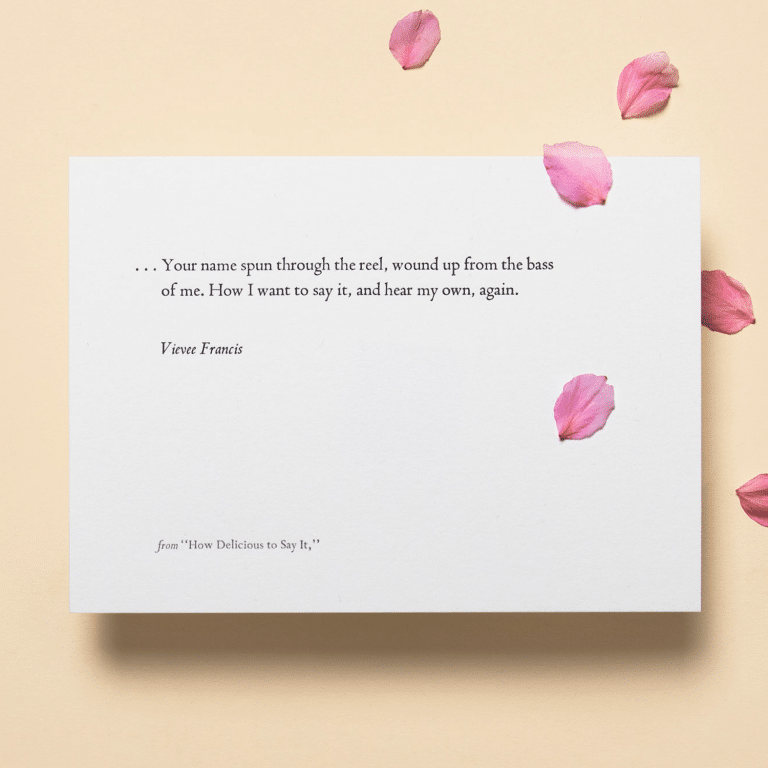
Letterpress prints by Myrna Keliher | Photography by Lucero Torres © All Rights Reserved.
Guest

Vievee Francis is the author of Blue-Tail Fly, Horse in the Dark, and Forest Primeval, winner of the Kingsley Tufts Poetry Award and the Hurston/Wright Legacy Award for Poetry. She is an associate professor at Dartmouth College and an associate editor for Callaloo.
Transcript
Pádraig Ó Tuama: My name is Pádraig Ó Tuama, and one of the things about love poetry is that love poetry asks you not just to write a love poem of your own, but to pay attention to the way that the love between you and someone else itself can be a poem — the love between you and a spouse, the love between you and a friend, between you and your family; that the shape that that love takes itself can be a poem, and to attend to and to craft and to shape that poem in a way that makes sense for the love that you share.
[music: “Praise the Rain” by Gautam Srikishan]
“How Delicious to Say It,” by Vievee Francis:
“How Delicious to Say It,
to allow it like hibiscus to wend over the tongue
where it opens at the gate, lending its red, unknowable
taste. What wonder the palate may embrace – in a flick
behind the teeth: loquacious, Liebchen, Schätzchen.
Let us praise the labium that shapes such syllables, and
parlay of their attendant assumptions like a shuttlecock
struck back and forth over its simple backyard net.
Let us not neglect, but laud the mature mouth ready
for more than a dollop, the spoonful of lip, loon,
April, billow, or some simple pronoun. No. It wants jouissance,
Dostoevsky, provocations heating the exchange, say
chipotles in the chocolate. Consider the uvular awakenings
of the day, the throat stretched to signify its pleasure and release.
Your name spun through the reel, wound up from the bass
of me. How I want to say it, and hear my own, again.
for Matthew”
[music: “Ashed to Air” by Gautam Srikishan]
I read this poem because it so immediately appealed to me with gorgeous words. I mean, I love the word “delicious.” I love the word “gorgeous.” I love the word “knuckle.” But I think this poem is a poem — perhaps — where the poet, Vievee Francis, was thinking, “What are my favorite words?” And she might have made a list. I’m just guessing, so it could be totally wrong. But it feels like, to me, that the prompt or the intuition or idea behind this poem is that she might have made a list of some of her favorite words and then thought, “Let me put them into a poem.” And I just thought that was such a delightful thing to do, and I found myself immediately thinking, what words would I write, if I was to write a poem filled with the words that I think are gorgeous?
In this poem, it seems to me that words like “hibiscus,” and then the verb “to wend,” a gorgeous old verb which means to turn or direct or “to wend your way” — “to go” — and then words like “loquacious,” meaning talkative. And then some German words — “liebchen” and “schätzchen” — little love, little darling, little honey. And then there’s some kind of Latin names for parts of the body — “labium,” meaning lips, and “uvular,” meaning “from the throat.” And then “parlay” from French, and “shuttlecock.” And then lovely words like “dollop” and “lip” and “loon” and “April” and “billow.”
And then it all finishes off with that dedication, “For Matthew.” And I think sometimes dedications are just there as dedications. But it feels like to me that this poem is building and building and building toward the word that she is saying is the most delicious of all to say, which isn’t “uvular” or “chipotle” or “chocolate” or “Dostoevsky” or “jouissance,” but “Matthew.” And therefore, this is a very clever, loving poem, filled with brilliance about language, but goes beyond language by saying, “Actually, it’s somebody’s name that I most enjoy saying.”
[music: “Ashed to Air” by Gautam Srikishan]
I think the “it” in this poem — and “it” comes from the title, “How Delicious To Say It” — I think the “it” in this poem might be the name of her husband, Matthew. It might be “love.” It might be saying that they love each other. It might be living their love with each other. It could be all of those things. But it does seem to me that there is a real particularity in the way that the poem finishes off by saying, “How I want to say it, and hear my own, again.”
The simplicity of the resolution of this poem is to say, Of all these gorgeous words, here’s the one I like to say most: “Matthew,” and to hear: “Vievee,” and in the space that’s created: “love.”
And that is a very gentle, calm, and beautiful but undemanding way to end up after a poem that has used so many rich words that you might go, “Oh, I’m not entirely sure what that means.” And I think that’s part of the play of the poem is to say — in the middle of all of these beautiful words and different languages, literary references to Dostoevsky, all of these different things that are happening in the poem — that it ends up in this profound simplicity.
And it makes me think that perhaps one of the desires of the poem is to say, simple love is not always so easy to come by. It takes work. It takes learning about each other. You’ve got to struggle through it. You’ve got to wait time. I think that this poem is speaking about mature love, because this, I don’t think, is young love, but rather a love that’s gone beyond the simple pleasures of these words like “lip” and “loon” and “April” and “billow,” but wants a sophisticated joy of old stories. This is a love that is not looking for a mere pleasure of quick satisfaction, but is praising growth and is honoring that.
And that is, I think, communicated through a poem that’s dense with words that you might need to look up — German, Spanish, Latin, French, Russian — things that take time to learn, because love takes time to learn. And the more in the flow of love you are, perhaps, the more the fruits of your love are simple things, in terms of saying each other’s name so beautifully. But it can take a long time to get into a long-lasting way within which friends or lovers can arrive at that profound sense of love.
[music: “At Dusk” by Gautam Srikishan]
There’s words like “dollop.” You just think of a dollop of cream in something that you’re gonna have. Who’s gonna object to a dollop of cream? But then you might think of the heat of exchange that she speaks of — chipotles and the chocolates — something that might burn the throat a little bit. You think of the arguments that people go through to get into a deep and long-lasting love. You think of the difficulties that they’ve had to overcome, think of all of these things that have been difficult to know how to get used to the taste of, but nonetheless, the more that you’re in this long-lasting relationship, the more you go, “This has paid off, to have stayed with this. And I have developed a taste for the sharpness of chipotles and the chocolate” that you might have not have wanted when you were in the first flush of love. But with mature love and with time, you go, yeah, this is actually a demonstration of love rather than a threat to it.
[music: “The House You Wake In” by Gautam Srikishan]
So Vievee Francis is the poet here, and the poem is dedicated to Matthew. And Matthew, her husband, is Matthew Olzmann, who is also a poet and who has written a love poem to her. I don’t know that they’re response poems to each other, but certainly they have love poems to each other in their books. And we’re going to be offering a Poetry Unbound reflection on Matthew Olzmann’s love poem to Vievee Francis, as well, and I’m looking forward to being able to hold these two very different and beautiful poems together.
But I think the invitation of this poem calls so many of us into all kinds of reflections. There are so many invitations — first of all, an invitation to think about what words do you take pleasure in saying? For me, the word “knuckle” is amongst the most pleasing word to say, at the moment. I looked it up, actually. It comes from an old Germanic set of words meaning bone and finger joint. And then another invitation is, what names do you love, and why? And why do you love saying the names of people that you love? Who is it whose name you love saying? And who do you love hearing say your name?
There’s something in this poem about how even the name of the person you’re in love with can remain unknowable, because Vievee Francis speaks about the “red, unknowable taste,” and then wonder and assumptions, and ways that we shouldn’t neglect, and we should be ready for more. And there’s reference in this poem to “provocations” and “awakening” and “stretched,” as well. And I think that’s one of the features of this poem that grounds it, not just in the first flush of love, but in the mystery that we are to each other. Sometimes, the more you’re with somebody — as a friend or as a partner, a sibling, a family member — the more they become strange to you, as you continue to love them. And we find ourselves in that complicated and beautiful territory of saying, how can any of us ever know another person? Sometimes we feel like we both know them and they still remain a mystery to us. And I think this poem knows that.
And then I think, too, there’s an invitation to think about who are you growing older with? And that may be a lover or a spouse, but it might also be somebody who’s been in your life and who is family by choice. There can be all kinds of ways where we grow older with each other and where our friendship and love for each other continues to both deepen and simplify at the same time.
[music: “The House You Wake In” by Gautam Srikishan]
“How Delicious To Say It,” by Vievee Francis:
“How delicious to say it,
to allow it like hibiscus to wend over the tongue
where it opens at the gate, lending its red, unknowable
taste. What wonder the palate may embrace – in a flick
behind the teeth: loquacious, ‘liebchen, schätzchen.’
Let us praise the labium that shapes such syllables, and
parlay of their attendant assumptions like a shuttlecock
struck back and forth over its simple backyard net.
Let us not neglect, but laud the mature mouth ready
for more than a dollop, the spoonful of lip, loon,
April, billow, or some simple pronoun. No. It wants jouissance,
Dostoevsky, provocations heating the exchange, say
chipotles in the chocolate. Consider the uvular awakenings
of the day, the throat stretched to signify its pleasure and release.
Your name spun through the reel, wound up from the bassof me. How I want to say it, and hear my own, again.
for Matthew”
[music: “Praise the Rain” by Gautam Srikishan]
Lily Percy: “How Delicious To Say It” comes from Vievee Francis’s book Forest Primeval. Thank you to Northwestern University Press and Triquarterly Books, who gave us permission to use Vievee’s poem. Read it on our website, at onbeing.org.
[music: “Praise the Rain” by Gautam Srikishan]
Poetry Unbound is: Gautam Srikishan, Chris Heagle, Erin Colasacco, Eddie Gonzalez, Lilian Vo, and me, Lily Percy.
Our music is composed and provided by Gautam Srikishan and Blue Dot Sessions. This podcast is produced by On Being Studios, which is located on Dakota land.
We also produce other podcasts you might enjoy, like On Being with Krista Tippett, Becoming Wise, and This Movie Changed Me. Find those wherever you like to listen, or visit us at onbeing.org to find out more.
Books & Music
Recommended Reading
The On Being Project is an affiliate partner of Bookshop.org and Amazon.com. Any earnings we receive through these affiliate partnerships go into directly supporting The On Being Project.






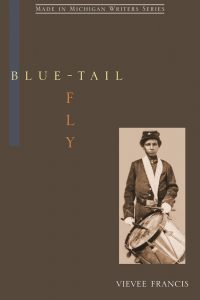
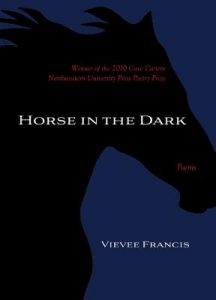
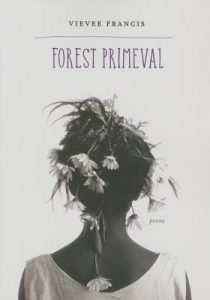

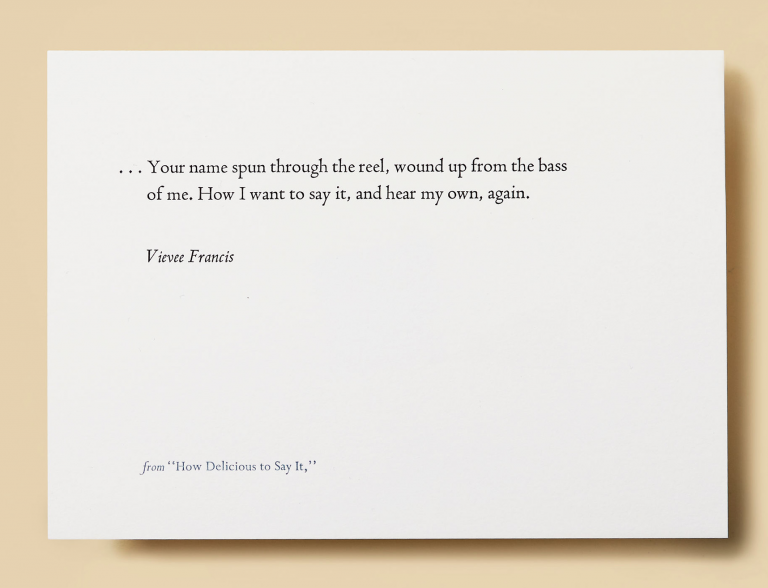
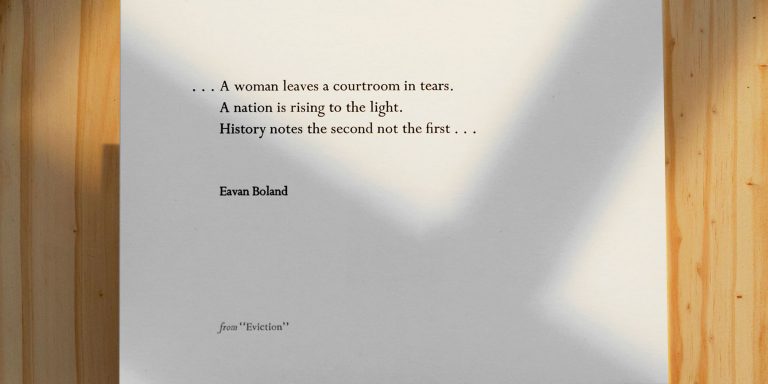
Reflections